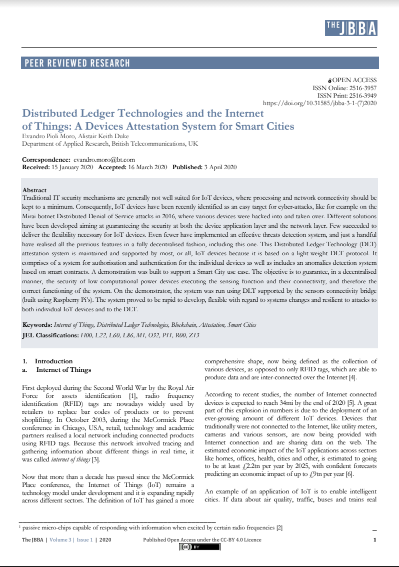
Distributed Ledger Technologies and the Internet of Things-A Devices Attestation System for Smart Cities
Published: 2020-01-01
Organization: JBBA
Tags: Internet of Things, Distributed Ledger Technologies, Blockchain, Attestation, Smart Cities, iot
Overview: Traditional IT security mechanisms are generally not well suited for IoT devices, where processing and network connectivity should be kept to a minimum. Consequently, IoT devices have been recently identified as an easy target for cyber-attacks, like for example on the Mirai botnet Distributed Denial of Service attacks in 2016, where various devices were hacked into and taken over. Different solutions have been developed aiming at guaranteeing the security at both the device application layer and the network layer. Few succeeded to deliver the flexibility necessary for IoT devices. Even fewer have implemented an effective threats detection system, and just a handful have realised all the previous features in a fully decentralised fashion, including this one. This Distributed Ledger Technology (DLT) attestation system is maintained and supported by most, or all, IoT devices because it is based on a light-weight DLT protocol. It comprises of a system for authorisation and authentication for the individual devices as well as includes an anomalies detection system based on smart contracts. A demonstration was built to support a Smart City use case. The objective is to guarantee, in a decentralised manner, the security of low computational power devices executing the sensing function and their connectivity, and therefore the correct functioning of the system. On the demonstrator, the system was run using DLT supported by the sensors connectivity bridge (built using Raspberry Pi’s). The system proved to be rapid to develop, flexible with regard to systems changes and resilient to attacks to both individual IoT devices and to the DLT.
